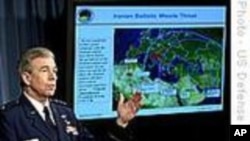At a recent Pentagon briefing, U.S. Lieutenant General Henry Obering, Director of the Missile Defense Agency, said the ballistic missile threat continues to proliferate around the world. "Access to these weapons," General Obering said, "has increased over the past many years and, in fact, two countries that we're very much concerned about – [include] specifically North Korea and Iran and the developments that they are continuing to make in their missiles."
Deploying U.S. missile defense assets in Europe is vital not only to U.S. security, but to the security of European Allies. The emerging threat that ballistic missiles pose to the United States and its Allies and friends was highlighted on July 9th when Iran tested a ballistic missile capable of reaching parts of southeastern Europe, the Middle East, and Central Asia. This underscores our concern that Iran is continuing to develop ballistic missiles of increasing range and sophistication.
In response to this growing threat, the U.S. has embarked on the development and fielding of a missile defense system aimed at defending the U.S. and its allies and friends against the risk of a ballistic missile attack. Under the plan, a missile defense radar station would be built in the Czech Republic, with interceptor missiles based in Poland. In July, the Czech Republic signed an agreement to host the radar site on its territory. Discussions continue about the proposed basing of interceptor missiles in Poland.
Russia has objected to the planned U.S. missile defense system, claiming that it could threaten Russian security. But General Obering reiterated that the missile defense system is not directed against Russia. "Ten interceptors in Poland," he said, "could absolutely not match the hundreds of interceptors and thousands of warheads that the Russians have deployed." The U.S. continues to engage Russia in discussions about the proposed missile defense system.
General Obering emphasized that a missile defense system reduces incentives for states to acquire ballistic missiles in the first place. That's why it remains in the interest of the United States, Russia, and Europe to work together on building an effective missile defense system.
Deploying U.S. missile defense assets in Europe is vital not only to U.S. security, but to the security of European Allies. The emerging threat that ballistic missiles pose to the United States and its Allies and friends was highlighted on July 9th when Iran tested a ballistic missile capable of reaching parts of southeastern Europe, the Middle East, and Central Asia. This underscores our concern that Iran is continuing to develop ballistic missiles of increasing range and sophistication.
In response to this growing threat, the U.S. has embarked on the development and fielding of a missile defense system aimed at defending the U.S. and its allies and friends against the risk of a ballistic missile attack. Under the plan, a missile defense radar station would be built in the Czech Republic, with interceptor missiles based in Poland. In July, the Czech Republic signed an agreement to host the radar site on its territory. Discussions continue about the proposed basing of interceptor missiles in Poland.
Russia has objected to the planned U.S. missile defense system, claiming that it could threaten Russian security. But General Obering reiterated that the missile defense system is not directed against Russia. "Ten interceptors in Poland," he said, "could absolutely not match the hundreds of interceptors and thousands of warheads that the Russians have deployed." The U.S. continues to engage Russia in discussions about the proposed missile defense system.
General Obering emphasized that a missile defense system reduces incentives for states to acquire ballistic missiles in the first place. That's why it remains in the interest of the United States, Russia, and Europe to work together on building an effective missile defense system.













